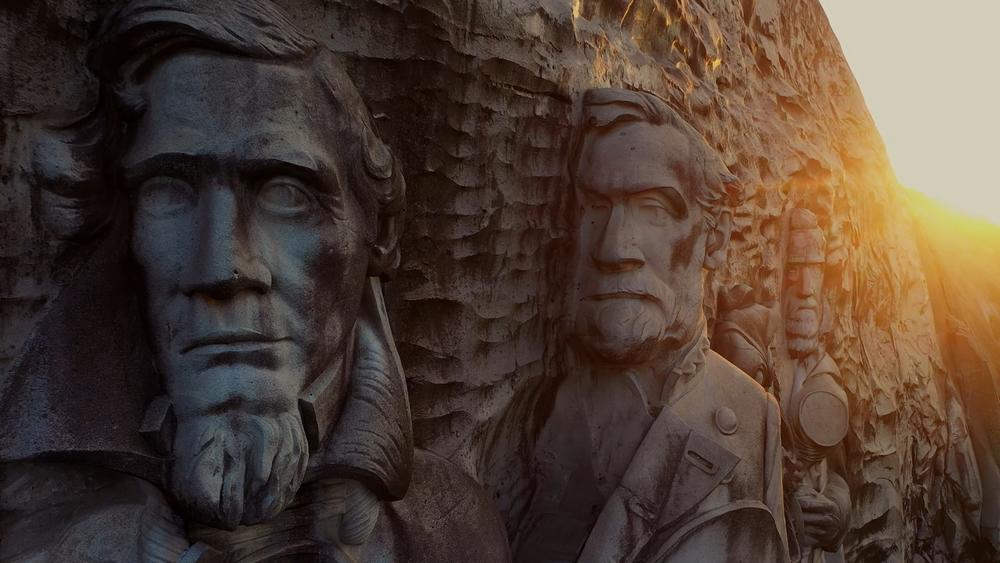
Section Branding
Header Content
A new Stone Mountain documentary examines the world's largest Confederate monument. Watch it here
Primary Content
LISTEN: GPB News' Peter Biello speaks with Kristian Weatherspoon, the vice president of digital storytelling at the Atlanta History Center, about a new documentary on the history of Stone Mountain.

Stone Mountain is home to the largest Confederate Monument in the world. It features carvings of three prominent leaders of the Confederacy. To some it’s a monument to Southern heritage, but to others it’s a painful reminder of the South’s effort to hold onto slavery and the oppression of Black Americans.
A new documentary from the Atlanta History Center highlights both views but with an emphasis on remembering Stone Mountain’s difficult past and present. It’s called Monument: The Untold Story of Stone Mountain. Watch it below.
GPB News' Peter Biello spoke with Kristian Weatherspoon, the vice president of digital storytelling at the Atlanta History Center, about the project.
TRANSCRIPT:
Peter Biello: What did you think was missing from the stories that have been told about Stone Mountain over the years?
Kristian Weatherspoon: I mean, a bit of context about myself. I am a Southerner, born and raised Mississippian. As a Southerner, I really thought that the voices of Southern people were really missing in the conversation. I mean, obviously, this is a hot button issue at a national level that has been happening for a while. And so from the coverage and just the exploration that I'd seen, I thought like, wow, it's certainly an issue, but it's something that really plays a little bit differently in the South, in this place, like where you grow up with it, you know, many of us are steeped in it. And so I think that is the reason that all the voices that you hear in the film — the majority of the voices, I should say — are from the South and they are from Georgia really specifically.
Peter Biello: One of the things that I thought was really interesting about Stone Mountain, some of the things the scholars in this documentary said was that it is it's almost less about the Civil War than it is about the civil rights movement of the 20th century. Can you talk a little bit about that?
Kristian Weatherspoon: Yeah, for sure. I mean, it was — I think the title kind of alludes to this untold history. And, I mean, we know that these are things that happen. This is history that's kind of been around. But a goal for us was to have packaged all this history in one place for people to see it honestly, for people to connect dots. And that is one important to connect is that the final carving effort was initiated by a segregationist governor who you hear from in the film, Marvin Griffin, just 57 days after the Brown v. Board of Education decision.
Peter Biello: That's the one that desegregated schools.
Kristian Weatherspoon: Yes. And so that is that in itself is just really telling, to be completely honest. And so, again, you know, the film really was, again, about making those [and] helping to create those "a-ha" moments. And so that is one thing. And then also the fact that the carving was not finished until 1972, which is fairly recent. I think many people think that this was some ancient, some ancient artifact or something that was done in the early, you know, 1910s. It was started then. But the completion of it wasn't until 1972. The film shows footage of that.
Peter Biello: Mm hmm. You included the daughter of the chief carver of Stone Mountain in this documentary. Her name is Donna Barron. She says the work of her father, Roy Faulkner, is meant to honor those that fought for the Confederacy. And it's meant to honor her father's work as well, which she calls a masterpiece. Here's what she said.
Donna Barron: "Sure, there's good, bad and ugly in every story. We just need to continue to focus on the good and not the bad."
Peter Biello: So that was countered by many people in the film who find that view abhorrent. Can you talk a little bit about Donna Barron's views and why you decided to include her?
Kristian Weatherspoon: We met Donna through a connection within the [Atlanta] History Center, and you know, that is her life's work at this point ... sharing what she sees as her father's legacy. You know, one thing we realized that Donna's point of view was representative of so many people in Georgia. And so for that reason, obviously, it was it was really important that that be included. And however you may feel about it, we think that it's important to be able to have these conversations, for people who may see things differently, who may be on opposite sides of this issue. But the ability to be able to sit down and have civil conversation is one of the only ways the Atlanta History Center sees as kind of moving forward.
Peter Biello: Mm hmm. This new documentary on Stone Mountain is part of a larger effort from the Atlanta History Center. Can you tell me about that larger effort?
Kristian Weatherspoon: Yes. This this documentary is part of a larger effort that we are calling Atlanta History Center Originals. And it is meant to house digital media content — videos, films, podcasting, blog content — that will really specifically focus on under-told stories.
Peter Biello: Can you give us a preview? What's the next subject?
Kristian Weatherspoon: Yeah, one of the next subjects that we are exploring right now is the 1912 lynching in Forsyth County and the expulsion of the Black residents in the county. And so we'll be exploring the forced expulsion and where did those people go and telling that story through the voices of the descendants of those who were expelled.

